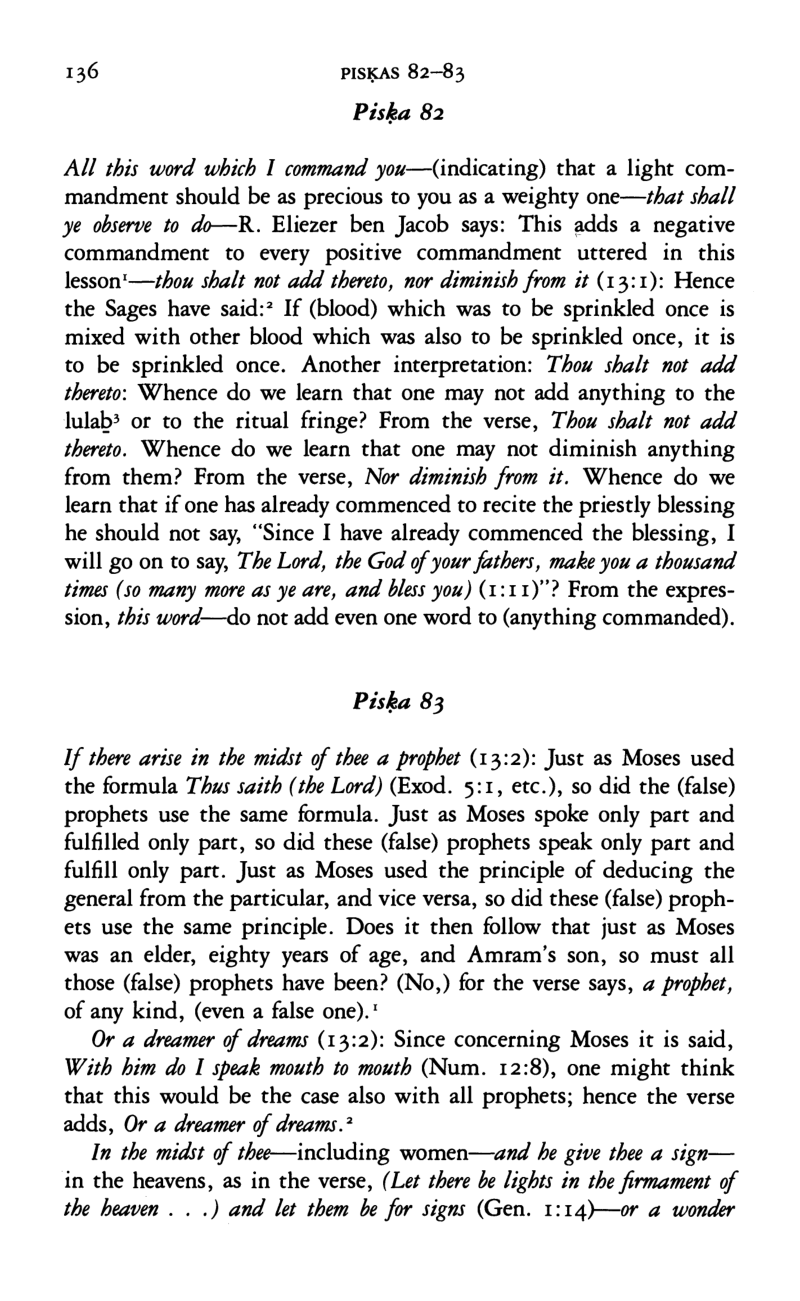Sifre on Deuteronomy offers an exegesis of the test of a prophet in Deuteronomy 13.
- Type
- Manuscript
- Source
- Reuven Hammer Non-LDS
- Hearsay
- Translation
- Reference
Sifre: A Tannaitic Commentary on the Book of Deuteronomy, trans. Reuven Hammer (Yale Judaica Series XXIV; New Haven: Yale University Press, 1986), 136-38
- Scribe/Publisher
- Yale University Press
- People
- Reuven Hammer
- Audience
- Reading Public
- Transcription
Pisḳa 83
If there arise in the midst of thee a prophet (13:2) : Just as Moses used the formula Thus saith (the Lord) (Exod. 5:1 , etc.), so did the (false) prophets use the same formula. Just as Moses spoke only part and fulfilled only part, so did these (false) prophets speak only part and fulfill only part. Just as Moses used the principle of deducing the general from the particular, and vice versa, so did these (false) prophets use the same principle. Does it then follow that just as Moses was an elder, eighty years of age, and Amram's son, so must all those (false) prophets have been? (No,) for the verse says, a prophet, of any kind, (even a false one). Or a dreamer of dreams (13:2) : Since concerning Moses it is said, With him do I speak mouth to mouth (Num. 12:8), one might think that this would be the case also with all prophets; hence the verse adds, Or a dreamer of dreams. In the midst of thee—including women—and he give thee a sign— in the heavens, as in the verse, (Let there be lights in the firmament of the heaven . . .) and let them be for signs (Gen. 1:14)—or a wonder (13:2)—on earth, as in the verse, If there be dew on the fleece only, and it he dry upon all the ground (Judg. 6:37), which is followed by, And God did so (Judg. 6:40)
Pisḳa 84
And the sign or the wonder come to pass . . .—R . Jose the Galilean said: See how far Scripture goes in that it permits heathens to have power even over sun and moon, stars and planets!—thou shalt not hearken—to them; why not?—for the Lord your God putteth you to proof, to know whether ye do love the Lord your God (13:3—4): Said R. Akiba : Heaven forbid that Go d should give the heathens dominion over sun, moon, stars, and planets. Scripture speaks here only of those who were at first true prophets but then lapsed and became false prophets, such as Hananiah ben Azzur.
Thou shalt not hearken unto the words of that prophet—except the one who has repented4—or unto that dreamer of dreams—except the one suspected retroactively5—for the Lord your God putteth you to proof, to know whether ye do love the Lord (13:4).
Pisḳa 85
After the Lord your God shall ye walk—this refers to (following the pillar of) cloud—and Him shall ye fear—meaning that the awe (of the Lord) shall be upon you—and His commandments—referring to positive commandments—shall ye keep—including (the implied) negative commandments—and unto His voice shall ye hearken—meaning the voice of His prophets 1—and Him ye shall serve—serve Him according to His Torah and in His Sanctuary—and unto Him shall ye cleave (13:6)—separat e yourselves from idolatry and cleave unto the Lord.
Pisḳa 86
And that prophet—but not one who is acting under compulsion—or that dreamer of dreams—but not one who is innocently mistaken—shall be put to death, because he hath spoken perversion against the Lord your God (13:6) : Is this not a matter of inference from the minor to the major? If one who falsifies the words of his companion is liable to death, so certainly is he who falsifies the words of God.
Who brought you out of the land of Egypt—even if He had no other claim upon you than that He had taken you out of the land of Egypt, that would have been sufficient—and redeemed thee out of the house of bondage—even if He had no other claim upon you other than that He had redeemed you from the house of bondage, that would have been sufficient—to draw thee aside out of the way (13:6) : "Drawing aside" is mentioned both here and elsewhere (13:11) ; just as the "drawing aside" there is punishable by stoning, so is "drawing aside" here punishable by stoning. R. Simeon, however, says that his execution in this case is by strangulation.
Another interpretation: To draw thee aside out of the way—this refers to positive commandments—which the Lord thy God commanded thee— this refers to negative commandments—to walk in—but not who says (to abandon) part of them and to observe the other part—so shalt thou put away the evil from the midst of thee (13:6)—remove the evildoer from Israel.
- Citations in Mormonr Qnas
The B. H. Roberts Foundation is not owned by, operated by, or affiliated with the Church of Jesus Christ of Latter-day Saints.

